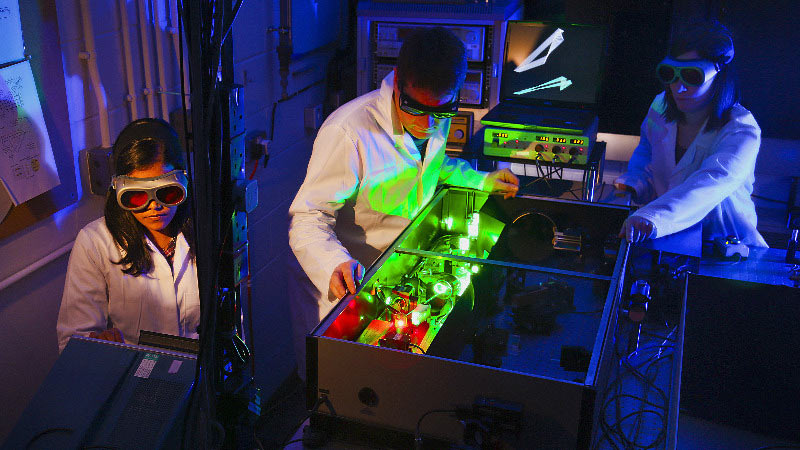What's it like to study here?

We provide a friendly and informal atmosphere to support your studies. The smaller laboratory, tutorial, and class sizes (particularly in the later years of study) allow a high degree of interaction between students and staff.
Highly engaging environment
To help with your transition to university, we run multiple group tutorials in the early years to offer you an excellent introduction to university study. This includes small group tutorials in year 1 in which around 4 students meet weekly with our staff to discuss mathematics and physics topics. Normally these small group tutorial sessions meet in-person; however video conferencing will allow these to continue during the current coronovirus pandemic situation.
Cohort-wide weekly discussion tutorials in years 1 and 2 offer an exciting chance to consider the latest developments in physics, explore the significance and ethics of science, and myth-bust some movie misconceptions!
In addition to this academic support, each student has a personal tutor allocated to them who is available to give general advice and guidance throughout their studies at Heriot-Watt.
Lectures – what to expect
Each of our courses typically has 2-4 sessions a week in which staff spend their time explaining the course content, discussing topics, and working through sample problems.
These are supported by complete online learning resources, which may include video podcasts, computer models and simulations, library and internet links, example assessments, and tutorial materials.
Interactive workshop and tutorial sessions, often supported by our experienced research staff and PhD students, give you the chance to ask questions and discuss topics in more detail.
Experimental Laboratories – what to expect
Experience in experimental physics is an important part of any physics degree, and our teaching laboratories are specifically designed to train you in experimental techniques as well as supporting your learning of physics concepts covered in other parts of your study.
Our first year laboratory offers a 'workshop' style introduction to experimental physics in semester 1, where we explore skills and techniques needed for practical laboratories. We will be adopting a 'blended learning' approach to allow our students the benefit of laboratory experience regardless of any prevailing coronavirus restrictions. In second semester students explore topics in optics, electronics and mechanics. This gives our students the opportunity to gain the fundamental skills that will allow them to carry out individual experiments in future years. Typically, there are the equivalent of 3 hours of timetabled laboratory work each week.
The second and third year teaching laboratories allow you to develop your skills using more advanced experiments. Experiments include studies into radioactivity, dynamics, solar-cell efficiency, aerodynamics, interferometry, optical fibres, and electronics. Computer modelling and computer interfaced experiments form a part of many activities. Typically the equivalent of 3 to 6 hours are spent per week in the laboratory, with additional time required to produce written reports, posters, and presentations.
All our fourth year students carry out an extended project. This offers our students the chance to demonstrate their skills, creativity, and critical thinking applied to a physics problem in a research environment. This project may be based around industry set problems or current research topics in physics and often allows exposure to research grade facilities based in our research laboratories.
In the fifth year, our MPhys students work on individual research projects in collaboration with one of the department’s world-leading research groups. Usually these students are embedded into the research group environment, and through this are exposed to our many national and international research projects.
Course structure
Year 1: The first year covers fundamentals of physics - including mechanics, optics, waves, quantum physics and electrostatics. This is supported by core courses in mathematics and physics problem solving. Practical skills in computer and experimental laboratories are also developed.
Year 2: Covers core physics topics including photonics, electronics, materials, thermal physics and astrophysics (physics degree without specialism only). Practical skills in problem solving, programming and experimental work are also developed.
Year 3: Key topics include electromagnetism, relativity, quantum theory and solid state physics. Practical experimental skills are developed in our advanced physics laboratory in preparation for project work in Years 4 and 5.
Year 4: In addition to further physics topics there is an emphasis on project work. All students undertake an individual research project. Continuing MPhys students may have the oportunity to continue the project theme into year 5.
Year 5: (MPhys only) advanced physics topics, including quantum theory, biophotonics and relativity are considered along with an in-depth individual research project normally based in one of our research groups.